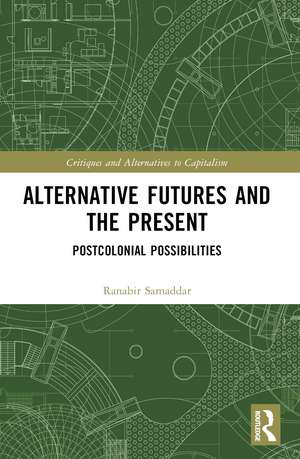Alternative Futures and the Present: Postcolonial Possibilities: Critiques and Alternatives to Capitalism
Autor Ranabir Samaddaren Limba Engleză Paperback – 9 oct 2024
Through engagement with selected modern thinkers, texts, and events, it imagines a different future from the position of the current postcolonial moment, indicating the possibilities that emerge from the present and which shape contemporary radical thinking.
An invitation to imagine a possible future marked with alternative possibilities of conducting struggles, and living through contentions and social restructuring, it will appeal to scholars with interests in social and political theory, political philosophy, colonialism and postcolonialism, and historical materialism.
| Toate formatele și edițiile | Preț | Express |
|---|---|---|
| Paperback (1) | 263.11 lei 6-8 săpt. | |
| Taylor & Francis – 9 oct 2024 | 263.11 lei 6-8 săpt. | |
| Hardback (1) | 897.86 lei 6-8 săpt. | |
| Taylor & Francis – 5 mai 2023 | 897.86 lei 6-8 săpt. |
Din seria Critiques and Alternatives to Capitalism
-
 Preț: 308.89 lei
Preț: 308.89 lei - 8%
 Preț: 389.15 lei
Preț: 389.15 lei -
 Preț: 309.20 lei
Preț: 309.20 lei - 9%
 Preț: 935.78 lei
Preț: 935.78 lei -
 Preț: 287.09 lei
Preț: 287.09 lei - 17%
 Preț: 257.94 lei
Preț: 257.94 lei - 18%
 Preț: 1003.75 lei
Preț: 1003.75 lei - 18%
 Preț: 1002.32 lei
Preț: 1002.32 lei - 18%
 Preț: 1000.76 lei
Preț: 1000.76 lei - 18%
 Preț: 1060.43 lei
Preț: 1060.43 lei - 8%
 Preț: 388.63 lei
Preț: 388.63 lei - 18%
 Preț: 1063.56 lei
Preț: 1063.56 lei - 18%
 Preț: 1003.75 lei
Preț: 1003.75 lei - 31%
 Preț: 767.38 lei
Preț: 767.38 lei - 33%
 Preț: 737.77 lei
Preț: 737.77 lei - 25%
 Preț: 766.85 lei
Preț: 766.85 lei - 18%
 Preț: 947.55 lei
Preț: 947.55 lei - 9%
 Preț: 937.19 lei
Preț: 937.19 lei
Preț: 263.11 lei
Preț vechi: 313.05 lei
-16% Nou
Puncte Express: 395
Preț estimativ în valută:
50.36€ • 54.72$ • 42.33£
50.36€ • 54.72$ • 42.33£
Carte tipărită la comandă
Livrare economică 21 aprilie-05 mai
Preluare comenzi: 021 569.72.76
Specificații
ISBN-13: 9781032404806
ISBN-10: 1032404809
Pagini: 330
Dimensiuni: 156 x 234 mm
Greutate: 0.61 kg
Ediția:1
Editura: Taylor & Francis
Colecția Routledge
Seria Critiques and Alternatives to Capitalism
Locul publicării:Oxford, United Kingdom
ISBN-10: 1032404809
Pagini: 330
Dimensiuni: 156 x 234 mm
Greutate: 0.61 kg
Ediția:1
Editura: Taylor & Francis
Colecția Routledge
Seria Critiques and Alternatives to Capitalism
Locul publicării:Oxford, United Kingdom
Public țintă
Academic and PostgraduateCuprins
Introduction: Time, and the Politics and Poetics of Alternative Section One: Social Transformation and the Space and Time of Nation 1 Karl Marx: Colonialism, Nation Form, and Social Transformation 2 Home, World, and an Uncertain Nation 3 In the Time of Nations Section Two: The Problematic of Population and Power in Transformative Politics 4 The Problem of Population: Recalling Marx’s Critique of Malthus 5 Populations and Populism as a Problematic in Transformative Politics Section Three: Two Universalisms: Imperial Imaginary and Imaginary of the Oppressed 6 Hegel’s India and Imperial Imaginary of the Universal 7 Annihilation of Caste and Universalism of the Oppressed Section Four: Contentions and Antagonisms as Template of Alternative Thinking 8 Charles Tilly’s Theorising of Contention 9 Genocide: A Most Contentious Word and Concept of Modern time Section Five: Beyond the Political, Imaginaries of Other Kinds 10 The Impossibility of Politics: Brecht, Manto and Two Acts of Literature 11 Memories of the Forgotten Section Six: Event as a Congealed Site of New Possibilities 12 Settling Account with the Point of Origin: Marx, Engels, and the Revolution of 1848 13 October Revolution as an Alternative in the Colonial and Postcolonial Time 14 Occupy College Street, 1967-69 15 Crisis, Biopolitics from Below, and a New Model of Public Power 16 Layers of Solidarity 17 Epilogue
Notă biografică
Ranabir Samaddar is currently the Distinguished Chair in Migration and Forced Migration Studies, Calcutta Research Group, Kolkata, India. He belongs to the critical school of thinking and is considered one of the foremost theorists in the field of migration and forced migration studies. His writings on migration, forms of labour, urbanisation, and political struggles have signalled a new turn in postcolonial thinking. Among his influential works are: The Marginal Nation: Transborder Migration from Bangladesh to West Bengal (1999) and Karl Marx and the Postcolonial Age (2018). His most recent publications are The Postcolonial Age of Migration (2020), and written in the background of the COVID pandemic, A Pandemic and the Politics of Life (2021).
Descriere
Through an engagement with selected texts, events and thinkers central to the present, this book offers an imagination of different possible futures from the position of the current postcolonial moment, indicating the possibilities that exist for conducting struggles, and living through contentions and social restructuring.
